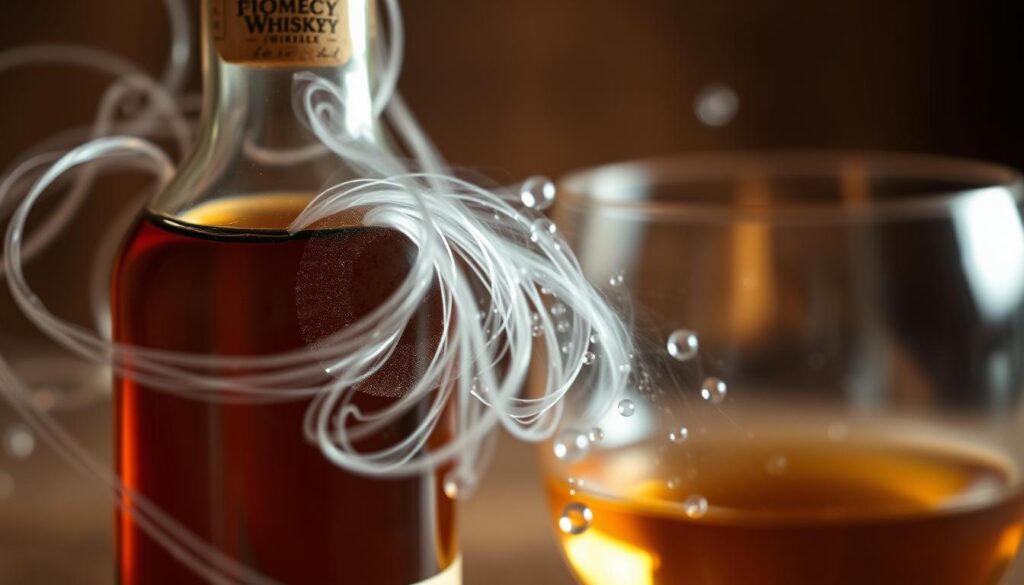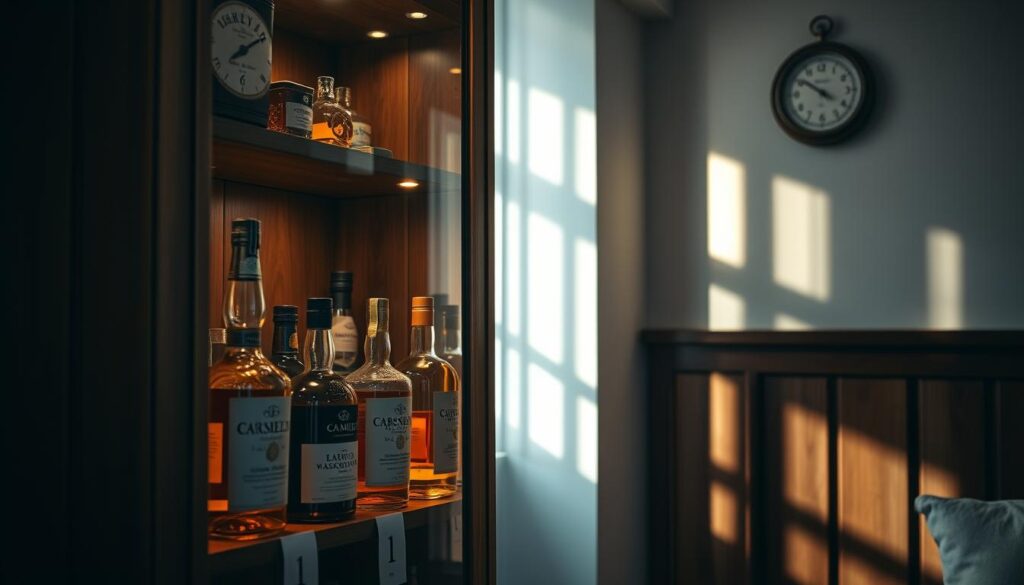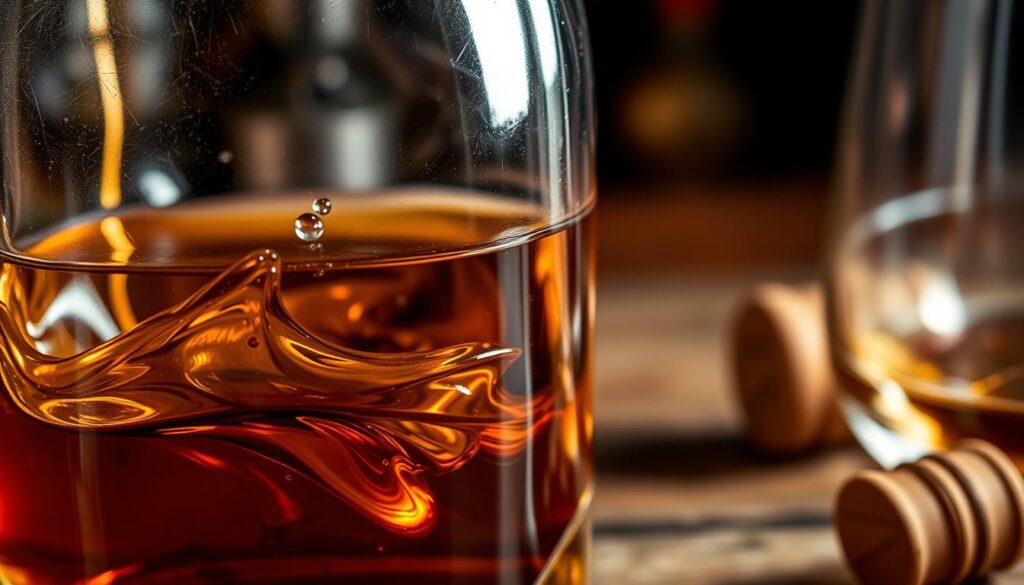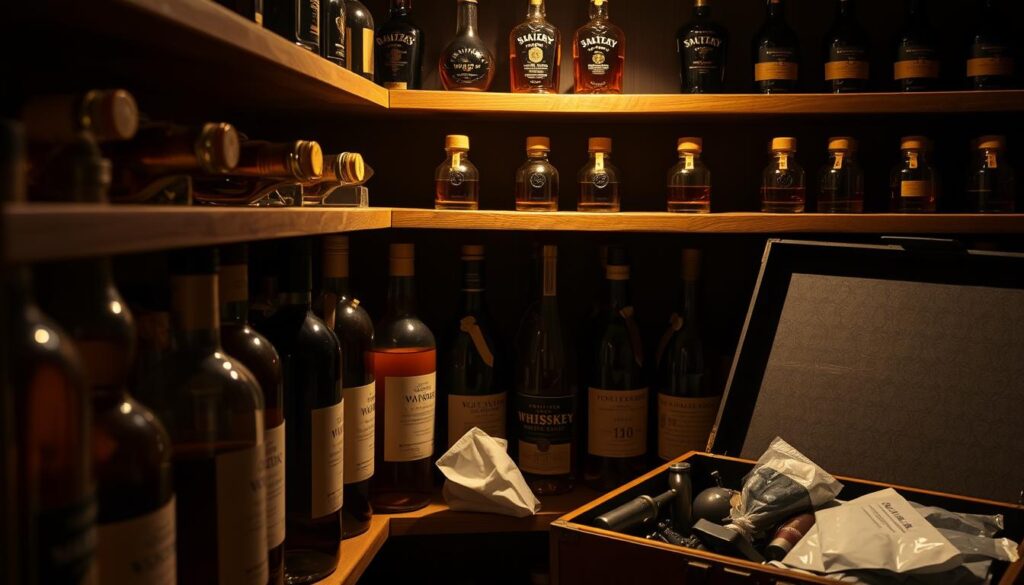Whiskey, often regarded as a timeless spirit, can last for years when unopened. However, once you break the seal, its lifespan becomes a bit more nuanced.
Factors such as storage conditions, exposure to air, and the amount remaining in the bottle play a significant role. These elements determine how long whiskey retains its flavor and quality after opening.
A bottle with more air in it will oxidize faster, affecting its taste and aroma. The type of whiskey — whether it’s a single malt, bourbon, or blended variety — can also influence its shelf life once opened.
In this guide, we’ll explore the factors that impact an open whiskey bottle’s longevity. Does whiskey expire? We’ll also cover how to ensure it stays enjoyable for as long as possible.
Understanding Whiskey Storage Basics
Storing whiskey right is crucial for keeping its flavor and quality. To maximize your bottle’s shelf life, always keep bottles upright to protect the cork. Store them in a cool, dark spot. The best temperature for storing whiskey is between low 60°F and under 70°F.
Avoid direct sunlight and big temperature changes. These can harm your whiskey’s taste. Unopened whiskey can last almost forever if stored correctly.
For whiskey lovers, the “infinity bottle” trend is exciting. It lets you mix the last drops from different bottles into a decanter. This creates a unique flavor.
Some enthusiasts even use an “infinity barrel.” They add new whiskies to it, making a blend that keeps changing. Proper whiskey storage techniques help your favorite spirits stay great for years.
Unopened Whiskey Shelf Life
Many whiskey fans ask about the expiration date of an unopened whiskey. The answer is simple: unopened whiskey can last forever if stored right. Unlike wine, whiskey’s taste doesn’t get better with time in the bottle. Its flavor stays fixed during distilling and aging.
To keep it fresh, store unopened whiskey bottles upright in a cool, dark spot. This stops a little evaporation that can happen over time. Even though whiskey doesn’t really expire, keeping it in a good place helps it stay great for years.
But once you open it, things change. The air gets in and starts to change the taste. An opened bottle of whiskey is usually best for one to two years. After that, you might notice some flavor changes, but it’s still safe to drink.
- Unopened whiskey: Indefinite shelf life
- Opened whiskey: 6 months to 2 years (depending on fullness)
- Store away from heat and sunlight
- Keep bottles upright to prevent leaking
Even though unopened whiskey can last forever, it’s meant to be enjoyed. So go ahead and open that special bottle you’ve been saving!
The Effects of Oxidation on Whiskey
Oxidation begins once you open a whiskey bottle, as air interacts with the liquid. This gradually alters the whiskey’s flavor, but research suggests these changes happen slowly.
For instance, a blind taste test by Wade Woodard revealed no significant flavor changes after a year. Similarly, Breaking Bourbon’s experiments showed minimal differences in taste over several weeks. These findings challenge the notion that whiskey deteriorates rapidly after opening.
Interestingly, some whiskey enthusiasts believe slight oxidation can initially enhance the flavor. However, prolonged exposure to air often leads to a decline in quality. Proper care ensures you enjoy its full character for as long as possible.

Temperature and Light Considerations
Proper storage is essential for preserving whiskey’s flavor and quality. Two critical factors are temperature and light, as they directly impact the condition of your bottles.
- Temperature:
Store whiskey in a cool spot, ideally below room temperature. This slows any chemical changes and helps maintain its quality. Avoid areas with fluctuating temperatures, which can cause the liquid to expand and contract, accelerating oxidation. - Light:
UV rays can alter the whiskey’s color and degrade its flavor. To prevent this, keep bottles away from direct sunlight. Storing them in a dark space, such as a cabinet or basement, is ideal. Dark glass bottles provide additional protection against light exposure.
By maintaining the right temperature and keeping whiskey out of direct light, you can preserve its flavor. This approach can even enhance the value of rare bottles over time. Proper storage is an investment in both enjoyment and collection longevity.

Proper Bottle Positioning and Maintenance
Storing whiskey bottles upright is essential to preserve their quality and longevity. Unlike wine, whiskey’s higher alcohol content can damage corks if stored horizontally, leading to leaks or spoilage. Keeping bottles upright minimizes liquid contact with the cork, reducing the risk of oxygen exposure.
For opened bottles, regular maintenance is key:
- Check and tighten screw caps or corks periodically to prevent air from entering.
- Occasionally, tip the bottle to moisten the cork, which helps prevent it from drying out and cracking.
Collectors should consider additional protective measures, such as wax seals or protective caps, to maintain freshness. However, avoid damaging the original packaging or labels, as these are crucial for the bottle’s resale or collector value.
By following proper storage and maintenance techniques, you can keep your whiskey in excellent condition for years, ensuring both its flavor and value remain intact.
How Long Does Whiskey Last After Opening: Keeping Open Whiskey at Its Best
Whiskey enthusiasts often wonder how to maintain its freshness after opening. Once you open a bottle, the whiskey’s taste gradually changes due to oxidation.
- A half-full bottle can retain its quality for 1-2 years.
- A quarter-full bottle may only last 3-4 months before noticeable changes.
Oxidation occurs as air fills the empty space in the bottle, altering the whiskey’s flavor and aroma. While whiskey doesn’t spoil like food, its flavors can fade over time.
For the best taste, aim to finish an opened bottle within two months. If you’re a collector or occasional drinker, using vacuum sealers or decanters can slow oxidation and preserve the whiskey’s quality. With proper storage, you can enjoy your whiskey long after opening.

Common Whiskey Storage Mistakes to Avoid
To keep your whiskey in top condition, steer clear of these common storage errors:
- Storing in sunlight: Exposure to UV rays can degrade both the flavor and appearance of whiskey. Always store bottles in a dark place.
- Laying bottles flat: Unlike wine, whiskey’s high alcohol content can deteriorate corks when in constant contact, leading to leaks or spoilage. Always store bottles upright.
- Temperature fluctuations: Drastic temperature changes can cause evaporation and negatively impact flavor. Aim for a stable environment with consistent, cool temperatures.
- Using decorative decanters: While attractive, some decanters are not airtight, which accelerates oxidation. Ensure any decanter used for whiskey storage has an airtight seal.
By avoiding these mistakes, you can preserve the flavor, aroma, and quality of your whiskey for years to come.
Tips for Whiskey Collectors
For dedicated collectors, preserving whiskey’s quality is essential. These advanced storage techniques can help maintain both flavor and value:
- Use Inert Gas or Vacuum Sealers: To minimize oxygen exposure, prevent oxidation by displacing air in the bottle’s headspace with inert gas or using vacuum sealers.
- Invest in Professional Storage: Specialized facilities with temperature and humidity controls provide ideal conditions for long-term storage, keeping bottles in pristine condition.
- Control Humidity: Maintain humidity levels between 60% and 70% to protect corks and labels from drying out or becoming damaged. Use dehumidifiers or humidifiers to achieve optimal conditions.
- Try the “Infinity Bottle” Trend: Combine the remaining pours from various bottles into a single decanter. This creates a unique, evolving blend that reflects your personal collection and tasting journey.
By implementing these methods, collectors can ensure their whiskey remains in excellent condition, whether for future enjoyment or investment purposes.

Wrapping Up: Savor the Spirit, One Sip at a Time
Whiskey is more than a drink — it takes you on a journey of flavors and craftsmanship. Whether it’s Scotch, Bourbon, or American Whisky, knowing how long it lasts after opening and storing it properly helps you preserve its essence. While whiskey doesn’t spoil, its flavors change over time, and proper care keeps every sip vibrant and enjoyable.
Don’t wait for the “perfect” moment. Pour that special bottle, share it with friends, and create lasting memories over a great dram.
At Scotland Whisky, we guide you in getting the most out of your collection. Explore our expertly crafted guides to master whiskey storage, discover rare bottles, and uncover the stories behind every pour. So grab your glass, uncork the bottle, and let the spirit shine. Cheers!